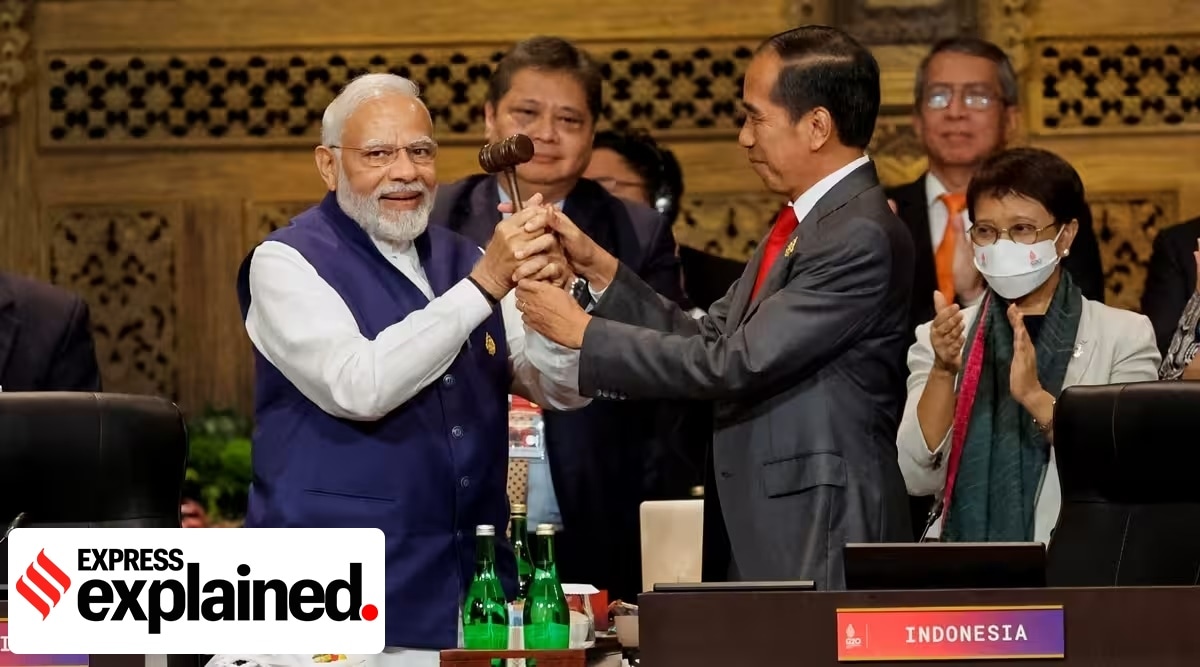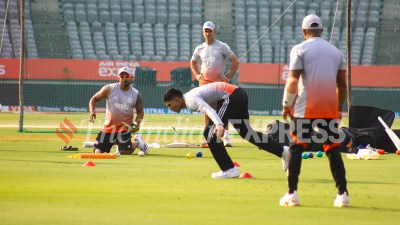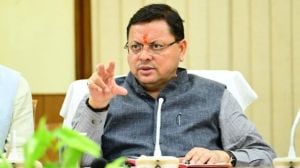G20 summit in India: What were the key takeaways from 2022 G20 meeting in Indonesia
Last year, the summit took place in Bali on November 15 and 16. It was the first G20 meeting since Russia began its invasion of Ukraine — the war broke out in February — and the first full-fledged physical leaders' meeting since the COVID-19 pandemic began.
 Prime Minister Narendra Modi and Indonesia's President Joko Widodo take part in the handover ceremony at the G20 Leaders' Summit, in Nusa Dua, Bali, Indonesia, Nov. 16, 2022. (Reuters)
Prime Minister Narendra Modi and Indonesia's President Joko Widodo take part in the handover ceremony at the G20 Leaders' Summit, in Nusa Dua, Bali, Indonesia, Nov. 16, 2022. (Reuters) Prime Minister Narendra Modi on Sunday (August 27) said the heads of 40 countries and many global organisations will be part of the G20 Leaders’ Summit to be held on September 9-10, which will be the “biggest” participation in the summit’s history.
“The month of September is going to witness the potential of India. India is fully prepared for the G20 Leaders’ Summit next month,” he said in the 104th episode of his monthly radio programme Mann Ki Baat.
India took over the G20 presidency from Indonesia on December 1, 2022. Last year, the summit took place in Bali on November 15 and 16. It was the first G20 meeting since Russia began its invasion of Ukraine — the war broke out in February — and the first full-fledged physical leaders’ meeting since the COVID-19 pandemic began. Here is a look at the circumstances under which the 2022 G20 summit was held and its key takeaways.
Context
Tensions were running high during last year’s G20 meeting in Bali. The Russia-Ukraine war had created an environment of growing rifts between the major geopolitical powers. There was a palpable fear that the summit would end without the release of a joint communiqué — a joint statement that showcases consensus among the participating countries.
“A summit without a declaration would have demonstrated the gap between the G20 Western governments on the one hand and the members of the BRICS group (the five leading emerging economies: Brazil, Russia, India, China, and South Africa) in particular Russia, China and India on the other,” according to a document, ‘Outcome of the 2022 G20 summit in Bali, Indonesia’, published by the European Union.
Apart from geopolitical tensions, the meeting took place at a time when global economic activity was slowing down at a faster rate than expected. Moreover, global inflation was higher than seen for decades.
“The cost of living crisis, interrupted supply chains, high energy prices, climate change and the COVID-19 pandemic” were all bogging down the global economy at the time.
Key takeaways
Despite negative expectations, a joint communiqué was released and it condemned Russian aggression against Ukraine.
The joint statement came after six rounds of talks and over 17 days of negotiations among the diplomatic negotiators, known as the G20 Sherpas. Although the leaders in their declaration mentioned that the G20 was a forum for global economic cooperation and not a forum to resolve security issues, the Russia-Ukraine conflict was addressed in the third point of the declaration. It stated that most leaders condemned the war and the use of, or threats of the use of, nuclear weapons.
The 52-point statement included a series of topics like food and energy security, trade, climate and biodiversity, health and digital transformation, the EU document said.
US President Joe Biden and Chinese President Xi Jinping held a bilateral meeting for the first time since Biden became president.
The presidents of the world’s two most powerful economies talked for about three hours at a time when the ties between their countries had been strained, and their post-meeting comments were seen as an incremental step towards rebuilding the fractured relationship.
Taiwan dominated the discussions, and in their readouts of the meetings, both leaders urged “peace and stability” in the Taiwan Strait.
Modi and Xi met at a dinner hosted by Indonesian President Joko Widodo.
This was possibly one of the most striking images out of the summit, as the two leaders — who had met at least 18 times between 2014 and 2019 — met after a two-year hiatus. In their first meeting in public since the India-China border standoff began in 2020, Prime Minister Modi and President Xi shook hands and spoke to each other.
While there was no substantive readout on the conversation that was captured by the cameras at the summit dinner, sources told The Indian Express that the two leaders “exchanged courtesies at the conclusion of the dinner”.
The Bali handshake took place towards the end of the dinner. The two leaders greeted each other as Xi walked by, and Modi, who was seen seated and chatting with US Secretary of State Antony Blinken, turned around and shook hands with him. The video showed a brief, relaxed conversation before the camera moved elsewhere.
India got the presidency of the G20, the first time the country will be holding an international summit of this scale.
Indonesia’s president handed over the gavel to the Indian prime minister as the next chair of the grouping during the summit. At the closing session, Prime Minister Modi told G20 leaders that India’s presidency will be “inclusive, ambitious, decisive, and action-oriented”. He underlined environment, women-led development, peace and security, economic growth, and technological innovation as priorities, which are embodied in the theme of India’s G20 chairmanship: “One Earth, One Family, One Future”.
- 01
- 02
- 03
- 04
- 05






































